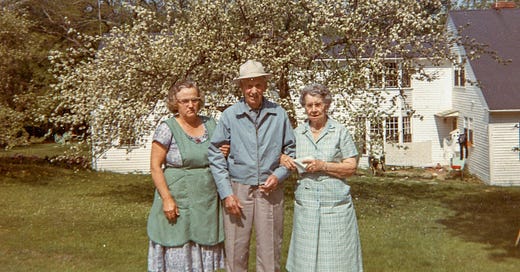Inja, Walter and Ida
A fairly recent photo, but undated. Any information about them?
Leonard Hastings the Potato Patch Preacher
Yesterdays posting about Miss Mildred Hasting elicited a number of comments and additional information. Carl Toko and tried to find her grave to no avail. This is a link to the post:
Subscriber Bill Thoms included some interesting material about her family and and the Potato Patch Preaches
Chapter 7—The Potato Patch Preaches
Leonard Hastings
NEAR the southern border of New Hampshire is the village of New Ipswich. Did you ever hear of New Ipswich, It was once an important town, business center of towns and cities which have now outstripped it, in New Hampshire and Massachusetts. And it was a center of Seventh-day Adventist influence, there being within a radius of ten miles as many towns holding believers of this faith. Leonard Hastings, farmer and preacher, was the leader. The Webber family lived ill town (this very house where we stayed overnight), Father Webber being a tailor; and their house was the common stopping place of workers and pilgrims, sometimes holding overnight as many as twenty or thirty persons. Up an ascending street were several houses, one still remaining, which the citizens called Advent Row, where Seventh-day Adventists lived. But now Mrs. Genevieve Webber Hastings and her (laughter Mildred are our only representatives there. Union Hall, in the town, is reputedly the place where Elder S. N. Haskell organized the first conference-wide Tract Society.
If you will go to Ellen G. White’s Life Sketches, you will find a story of early New Ipswich. “We found Brother Leonard Hastings’ family in deep affliction.” Mrs. Hastings had a baby boy, eight weeks old, who cried continually, wearing away the strength of the mother, who was already weak. They prayed and anointed the babe. His cries ceased, and James and Ellen White left the parents deeply grateful. “Our interview with that dear family was very precious. Our hearts were knit together. Especially was the heart of Sister Hastings knit with mine, as were those of David and Jonathan. Our union was not marred while she lived”-which was not long, for a year later word reached them in Oswego that Sister Hastings had died suddenly-of what was then called bilious fever, appendicitis. “This news fell upon me with crushing weight. It was difficult to be reconciled to it. She was capable of doing much good in the cause of God. She was a pillar in the cause of truth.” That infant was Fred Hastings. And it was his widow in whose home we were now visiting.
Miss Mildred went with us on a drive three miles, up and up, to the site of the old Hastings home, where Brother and Sister White found them. The view from that high rolling land is beautiful, away out over the valleys in three directions, with the mountain behind. The house is gone, and only the crumbling cellar remains. But the potato patch is there, and when we visited, there were potatoes growing in it!
The potato patch figures in more than one case of Adventists in 1844. It appears that an infectious disease, causing rot, attacked the crop in the fall or the winter of 1844-1845; and so devastating was it that in the spring seed potatoes sold for as much as $5 a bushel. But, of course, in the early autumn of 1844 no one knew it was going to be that way.
Leonard Hastings was a believer in the message that the Lord was coming on October 22, 1844. His main business was pasturing and caring for cattle which were driven up from Massachusetts for the summer. But he grew enough produce to supply his family, and a potato crop for sale.
Right next to his house he had a large field of potatoes. It came time to dig them, in September or October, but he did not dig them. His neighbors-they were not very close neighbors, but they got around, especially to the “Advent’s”-they came and said, “Aren’t you going to dig your potatoes?”
“No,” said Leonard Hastings, “I’ll not want them. The Lord is coming.”
“We’ll dig them for you,” they offered.
“No,” he answered. “I’m going to let that field of potatoes preach my faith in the Lord’s soon coming.”
“Old fool!” they said behind his back, “He’ll find out he needs his potatoes.”
Well, of course the day passed, and the Lord did not come. But the potatoes were saved, and so they preached a sermon of the reward of faith, even if the larger faith was disappointed. Loughborough says, “As the fall ‘Was mild, and Mr. Hastings’ potatoes were left in the ground until November ... he had an abundant supply for himself and his unfortunate neighbors.” Mrs. Genevieve Hastings says this is true; so it seems that the rot attacked the early dug potatoes but not those dug later. -
On this day - October 8, 1897
William Jurian Kaula diary - no entry
On this day - October 8, 1908
James Roger diary entry
8th (Thursday)
Frosty fine cool day. Wind westerly. David at Preston cabin with Henry Royce fixing wall for breakwater. Mother and I cleaned up church vestry & c and I filled lamps in Hall and vestry and picked 2 roosters. At Grange tonight there were 19 present, 2 visitors. Rehearsal of 3rd degree short literary program. Closed 1115 pm.
Fall Foliage Art Tour 2022
This weekend October 8,9,10 in New Ipswich, NH
More information on their Facebook Page




